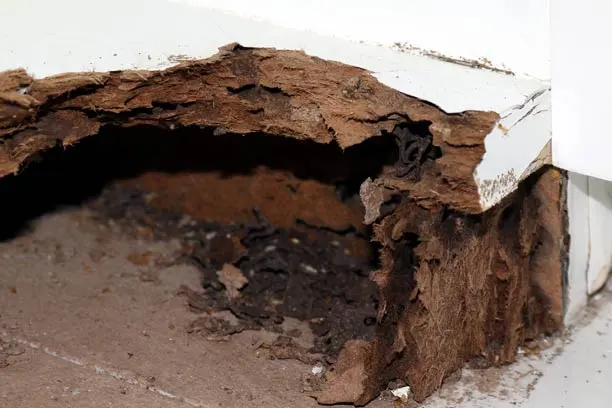Does Homeowners Insurance Cover Termite Damage?


If you’re wondering what homeowners insurance doesn’t cover, you’re not alone—and for good reason! In short, your homeowners insurance typically does not cover termite damage. Colonies from a few hundred to several million can devastate the structural integrity of your property. Sagging floors, walls and ceilings are common examples of termite damage. These pests can cause billions of dollars in damage each year and their ability to go undetected is an unsettling thought.
So, your home has a termite infestation—a nightmare for anyone. Now you’re wondering if termite damage is covered by insurance. Many people assume that their basic homeowners insurance policy will pay for any type of damage that happens to their home and the property inside it, but what does homeowners insurance really cover?
When it comes to termite damage at your home, many insurance companies won’t cover it because the cause of the damage is typically not sudden and often occurs overtime and could be from a lack of home maintenance.
Here are tips to prevent termites from causing issues at home.
With wood being a main food source for termites and soil being their home, keeping those separated can help prevent termites from infiltrating your home.
Termites thrive in damp environments. By keeping soil away from your house, you’ll play a role in keeping your foundation dry.
Of course, with moisture comes humidity. Making sure your crawl spaces are well ventilated to reduce the humidity levels can reduce the risk of termites making a home there.
While mulching your garden beds looks great for the value of your home, it can serve as a nesting spot for termites. If you’re going to mulch your gardens, try to keep the mulch away from the foundation of your home as much as possible.
If you’re worried your prevention methods aren’t keeping the termites away, consider contacting a local pest control company to regularly stop by for inspections and treatment.
If you suspect termite activity at your home, it may be best to arrange for a licensed pest control company to inspect and treat your home on a regular basis. Termites eat a variety of food sources including paper, dead plants, wood and more by surviving in the soil that sits against your foundation. If you notice water damage in your home or a hollow sound when knocking on wood, you may need to bring in a pest professional to assess the situation.
When it comes to your home, keeping it clean and safe is important. Meeting with your Farm Bureau agent for a SuperCheck® can help you determine if there are any gaps in your homeowners insurance or new coverages that can be added to your existing policy.